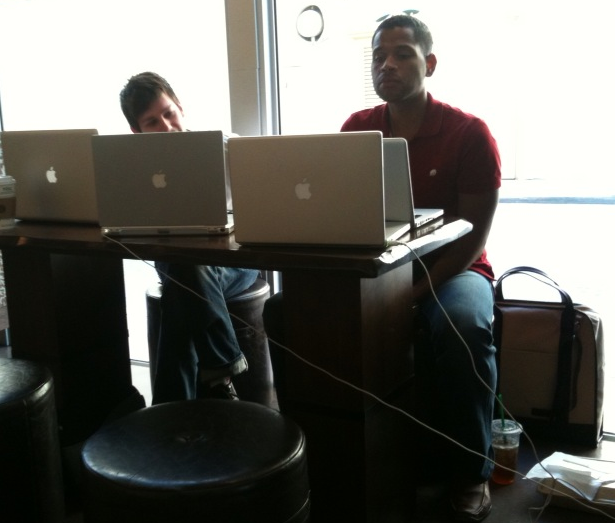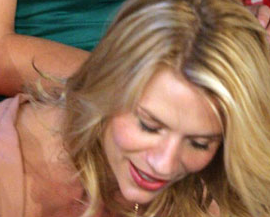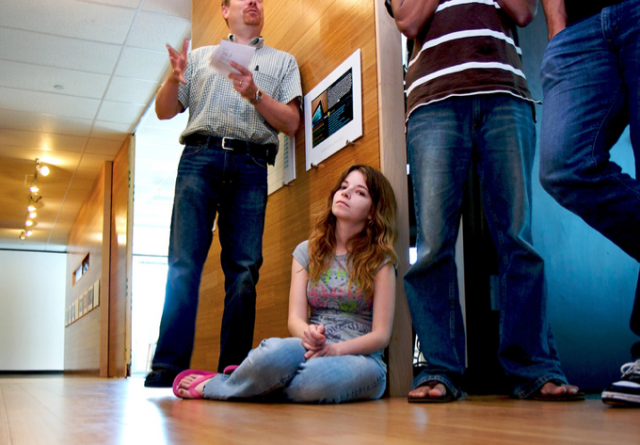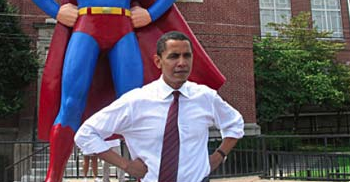IRL Made Me Hate You
by Daniel D’Addario

Some people in life are nice. Or they’re nice to me, and then really funny when they’re mean to others. They compliment me on my clothes (or pull me aside, ever so gently, to tell me when a certain item needs to be retired from rotation). Some people, other people, are famous, in that way people are sometimes-mention their name when you’re temping at an office, or around the Thanksgiving table and you’d get blank stares, but everyone that I care about impressing knows them. I die when I get a casual email from them-but seeing them around is even better!
But other people, people I once knew and loved, I have been forced to remove from my life-because real life made me hate them.
The real world-so uncomfortably, as I have discovered!-shows all too often how people are so funny and smart online but are then total jerks if you actually talk to them. I just go crazy sometimes with this real-world relationship stuff! It will be so much easier when people just use computers for everything. For now, I’m stuck with sometimes seeing these…. people, but I’m cutting them out as best I can.
Cutting people out of your real life isn’t as clean or perfect as pressing a button. I wish! For instance, there was, let’s call him “Jim Ponywatch,” the guy in my book group who was always clearing his throat in the most annoying way. It was so uncomfortable when I reached my breaking point and asked him to stop coming to our meetings, especially since he’d brought the Emmenthaler that month.
Also it was pretty uncomfortable when the rest of the group kicked me out instead-the new David Mitchell is pretty hard to read alone!-but it’s pretty thoughtful that “Jim” crosses the street when he sees me. So I don’t have to hear that raspy cough anymore.
Gosh, I hate to call him out in this passive aggressive way but I have to do it online, because I’ll never see him in person again!
You know what? Everyone is such an asshole! Why is everyone such an asshole? It makes things really difficult; life takes a lot of focus for me now. I signed up for a FreshDirect account I didn’t need to get away from the produce guy who I think leered at me that time.
And my former college roommate (and former friend, ha ha!) “Beth” just can’t stop calling me to talk as I’m getting ready to do something really important, so then I have to deal with that for an hour before I can move forward-or at least, I HAD to, until I decided to stop taking her calls. Doesn’t she understand I have a life outside talking to her?
And all those cousins who talk about how they’re not pregnant yet but they’re “having fun trying,” or people who check out back issues of People from the public library, and the last guy I slept with, who had a DVD of Full Metal Jacket on his bedside table and asked me if I wanted to watch it with him. I just have to keep my blinders up, all the time. Monsters, everywhere.
Then there was my brother, “Spike,” who’s constantly talking about things that are just so boring-his work, his cooking class. He’s innocuous over email and in chat but really, such a jerk in real life. So self-absorbed. Just because I work from home doesn’t make me less of a person, you know? To say nothing of the fact that he likes the Black Eyed Peas. I had to stop going to family events so I wouldn’t have to deal with his stream of vacuous nonsense.
But I think I’ve found a good replacement-this guy I met at the post office when he was getting The New Criterion out of a P.O. Box. We haven’t talked yet, but I bet he has a lot of good stuff to say. I bet he’s a good listener, too.
Dan D’Addario is one step ahead of you.
Octopus Predicts World Cup Results With Startling Accuracy
Holy crap! This octopus in Germany has accurately predicted the LAST SIX MATCHES of the World Cup for which his powers of prophesy have been consulted. Scoff if you must, but consider the odds: This cephalopod conjecturer has only a fifty percent chance of being right each time, and yet SIX TIMES IN A ROW his prognosticating tentacles have in fact chosen the correct group of men who would kick more balls into a ropey hole than their opponents. It is positively astounding! How can people be discussing trivialities like the role of women in popular entertainment when such magic exists in the world? Yes, sure, I know some of you might be inclined to view this as a series of meaningless choices, the celebration of which shows our inability to comprehend the essentially random nature of the world without ascribing some deeper meaning to it, but come on, OCTOPUS WAS RIGHT SIX TIMES IN A ROW. Truly, he has been touched by the hand of God. All eight of them, apparently.
The Emmys: The Great Lead Actress in a Miniseries Mystery

Which one of these things is not like the other?
Emmy Nominations for Lead Actress in a Miniseries
Maggie Smith
Joan Allen
Dame Judi Dench
Hope Davis
Claire Danes
New Inventions! The "Solar Panel" Collects Energy

Scientists and energy companies were shocked yesterday when a new invention, the “solar panel”-so-called because, using cell batteries into flat panels, it collects energy from Sol-successfully powered the flight of a tiny, one-seater airplane. It traveled up to 78 miles per hour, and is expected, in the distant future, to revolutionize the oil and nuclear industries. Other applications of this new technology, said futurists, might be to power tiny golf carts and rich people’s swimming pools.
How I Spent My Summer Vacation

After a day and a night and half of another day of arduous climbing, we reached the peak of pike. My guide, whose task of assisting my ascent had proven even more difficult given my poor level of fitness and ceaseless torrent of complaints about how difficult it was to smoke cigarettes in the thin mountain air, seemed relieved that we had completed our journey after all.
“There,” he said, gesturing to a small cave at the foot of the summit. “In there you will find the answers that you seek.”
I had come halfway around the world in search of clarity and purpose; in search, finally, of meaning. After hours and days and weeks and years where the burdens of experience had accumulated so heavily on my heart that I felt weighed down by my very being I had decided that it was enough. I needed to know why: Why all this endless suffering, this seeming futility of existence? I read the great texts of the major religions, but they provided little relief. The annals of scientific reasoning likewise brought me no closer to comprehension. And then I heard tell of a great sage who, many years earlier, had renounced all worldly pleasures and confined himself to a barren hold on the top of an ancient dome where he could contemplate the very question that had been troubling his slumbers. Those who were able to make the trek to his retreat returned with a sense of spiritual satisfaction and a new understanding of why we are put upon this earth. With considerably more resolve than I had managed to muster in months, I booked passage upon a freighter and made my way to the mountain. And now, here I stood, ready for revelation.
I moved slowly toward the entrance to the cave. A small, calm voice emerged from within its bowels.
“You have come a very long way,” said the sage.
“I have.”
“Well, then, perhaps it is best that we resolve your question as quickly as possible. What is it that you wish to know?”
The moment of truth having arrived at last, I found myself at a loss for words. I stammered something about the meaning of life and than stood very still, staring at my feet.
The master chuckled.
“You wish to know why we are here,” he laughed.
By now my eyes had adjusted to the darkness of the cave and I could see the man in his fullness. Wizened with age and entirely without hair, he sat cross-legged on a craggy stone with only a thin shawl to protect him from the mountain’s elements. The cave was indeed dark, and yet it seemed as if an otherworldy light shone all around him.
“Yes, master,” I finally responded.
He put a finger to his lips and beckoned me forward. In his hand he held what on closer reflection turned out to be a small, cracked mirror.
“Look within,” he said. “What do you see?”
“I see myself,” I said.
“And what are you?” he asked.
“A man?”
“What sort of man? Think carefully before you answer.”
I did not speak for several minutes. The question seemed impossible.
“Hold up your hands,” said the sage patiently.
I did so.
“Cup your fingers in your palms and point your hands toward your body,” he continued.
I did so.
“I will ask you a question. Your response will tell you all you need to know about everything.”
I nodded, continuing to hold my clenched fists aloft with the two digits at their ends pointing at me as if they were accusatory hooks. I could practically hear the silence.
“What,” said the master, holding the mirror up so that I could see myself, “has two thumbs and likes blowjobs?”
“This guy,” I responded, now lighter than air and gifted with the knowledge of what really matters. Blowjobs. Life is all about blowjobs.
Anyway, I’m back! Did ya miss me? Not as much as I missed you! Love you guys.
[Pic via]
Some Summer Interns
by Daniel D’Addario

A recent Times article on the restrictiveness of summer internship guidelines painted a certain picture of those students for whom summer is a time for building one’s resume-for the students with whom the average Sunday Styles reader is acquainted. Writing a trend piece on the summer internship, or the youngs in general, however attractive a poster child any wistful art-history major locked out of art-industry positions might be, is an impossible thing to do.
I should know-I tried to write one, having pitched and reported a story that was killed for its narrative drift, its lack of hook. The experiences students encounter when arranging summer work are so particular that they can’t be reported as part of a larger story about the economy or about This Generation. They mainly indicate that people are resourceful, far more resourceful than the stymied twentysomethings of a trend story, and that they are willing to reinvent just what summer work can be, even if on a very small scale.
Amanda Cormier, a rising Columbia junior, planned ahead to combine an unpaid internship with paid work (this is a notion that the Times left unexplored). Cormier spoke enthusiastically about her internship at the New York Observer, where she estimated she’d be working about thirty-five hours a week, unpaid. While this number may seem staggering, Amanda praised the Observer’s flexibility; they’ve allowed her to take one day off a week to work as an assistant to a Columbia computer science professor.
To speak with Amanda is to observe that ability to willfully create experience that gets lost post-college. “I got hired at the beginning of the year as an assistant,” she said of her work at Columbia, “and started redesigning the website, filed and started a library system-a lot of work-study jobs are just swiping [ID cards in dorms].” Amanda worked to create a good relationship with her employer from their first meeting last September, knowing that she would be looking for employment in the summer.
Amanda’s department now pays her directly, so as not to reduce her work-study allocation for the coming year. “There’s options-you just have to do it proactively,” she said. In past summers, she’s worked at Jack in the Box, Cold Stone Creamery and a summer camp. This summer is meant to maximize her experience in a manageable fashion, though: “I guess it would be really fantastic if I got some actual journalism experience without going broke or going into debt.”
Yin Yin Lu, also a rising junior at Columbia, is attempting the same balance of experience and feeding herself, as editor of the Columbia-produced guidebook Inside New York, a paid position. As the staff turns over yearly-this is Yin’s first summer as editor-in-chief, though she was features editor last summer-the book is written practically from scratch each year before being sold in the Columbia bookstore and nationally. “The reason people want to be involved with Inside New York -the money is not the first thing, it’s just an added benefit.” Which is a good thing, as, aside from comped meals at fancy restaurants and tickets to shows, the student writers for the guidebook whom Yin oversees are unpaid.
Yin estimated, though, that she will make $4500 from her ten weeks of work at $10 per billable hour-making a profit after deducting her inexpensive sublet near Columbia. (Housing represents one of the great anxieties for college students working away from home: Amanda considered sharing a studio apartment with a forty-year-old woman in Inwood; her mother protested.) Last summer, as the editor of the book’s features section, she made $1100 while interning at a publishing house in an unpaid capacity and commuting daily from New Jersey.
Moving to New York represents a reduction in transportation expenses and will allow her to work late hours on the book, as unpaid correspondents tend to feel more alienated from their labor than will their editor. “The biggest problem, I think, last summer was more organizational than anything else-a lot of writers went on vacation without telling us.” Yin developed her plans for summer housing and summer employment in tandem, and is unlikely to take a break from a situation she so painstakingly arranged. Last summer, she says, “I was doing Inside New York not only on vacation, but [at home] in Jersey, and I edited articles on a vacation in Florida.”
For other students, the pre-planned, paid summer experience and the travel-though not vacation-are one and the same. Carolyn Brown, a rising senior at Brown, arranged for funding through her university for a study trip to American Samoa. “I started working on my summer project this past fall,” Carolyn wrote in an email; she had been working on an independent study analyzing data sets on gestational diabetes in Samoa when she suggested to her professor that she might look into barriers to prenatal care.
Like Amanda’s, Carolyn’s summer would not be possible without serious forethought. She’s using a $3500 grant from Brown to travel and research. And also like Amanda, Carolyn is taking something of a financial loss to research rather than take a hypothetical, traditional summer job: she said that plane tickets cost about $2000 and the balance of her grant will go towards “living expenses, a translator and assistant” and other work-related costs.
She has spent the past two summers building greenhouses with a local non-governmental organization in Honduras. Before college, she had worked in a restaurant and summer camps.
Something about the pressure-cooker environment of college-merged with the dwindling availability of waiting and camp counseling jobs and the like-makes certain students gear up for summer early in the school year, ensuring that they take advantage of institutional connections.
Even students less strategic about university streams of money than Amanda, Yin and Carolyn have pulled together intriguing summers. I spoke to a friend of mine, a rising senior at Columbia who preferred not to be named because of the confidential nature of his project, who had no definite plan for the summer as recently as February-an eternity, by some standards. “I eventually decided not to do two jobs [at once], but I was never sure how this was going to materialize,” he said. Relatives connected him to a man in prison who was looking to pay a writer to produce a nonfiction account of his life, and by April he had gotten the prisoner’s approval.
In some ways, my friend’s project provides but an excuse to stay in New York, that internship Valhalla. He’s taking a history class at Columbia while doing research for his book, largely in New Jersey and he hopes to have a complete outline and several chapters done by the time school is back in session. As for money, “there’s enough assistance for what the summer will cost. After three years, I feel like I’ve learned enough about what limits to stay inside of. If I manage that effectively, then I should be in good shape.”
My friend had worked in a restaurant and as a bank teller in his high school years in the Midwest. But then during the past two summers, he’d been a full-time tutor in New York and a full-time intern in Washington. “I think it’d be really cool, because I’d love to be in Michigan for the summer,” he said. “It’s just the way circumstances have gone for the past three years.”
He’s as assiduous a planner as anyone I know, and his seeming wistfulness at not being able to return home represents to me how “work experience” has shifted in definition. It has moved towards a notion of using one’s time in as practical a manner as possible-in a quiet, maybe boring valley somewhere between mercenary and hedonistic.
Daniel D’Addario has written about college for The Daily Beast and IvyGate and about movies for Newsweek.
Photo by Travis Isaacs, from Flickr.
"Great Gazette! This 3D Periodical Has Pizzazz!"
“There are things you want to see in 3D in a magazine like Time Out New York and things you don’t. But before we can see anything, we have to assemble the glasses.”
Domino's Taking Brave Stand In The War Against Photoshop
Sick of models that have been manipulated unnaturally for the purposes of selling a product? Well, so is Domino’s Pizza, which is blowing the lid off the food-styling industry in the latest installment of the pizza chain’s Totally Real Talk Campaign. The above video shows the machinations that an innocent little pizza has to go through in order to be camera-ready — including nails and blowtorches! What sort of messages about how a pizza should look does this send out to impressionable children? Domino’s has decided to unshackle itself from this world of fakery, so it’s come up with a pledge involving the verisimilitude of photos it uses in the future. (It’s signed by the chief marketing officer, so you know it’s serious!)
We will only photograph real, honest-to-goodness pizzas.
That means fresh from our own ovens, with exactly the same ingredients we deliver to your doorstep. Nothing else added.
Our employees will make the pizza we shoot.
Not an art director or model maker or food stylist. A Domino’s employee trained to make pizzas the only way they know how: by hand.
We will not artificially manipulate the food we shoot.
No tweezers, no steam guns, no model knives cutting perfect perforations in the cheese. The only thing that will touch the pizzas we shoot is the pizza-maker’s hands and a standard Domino’s pizza cutter.
But the folks at Domino’s won’t be the only ones not manipulating their pizzas — they’re also throwing a user-generated photo contest! The person who takes the best Real Pizza Picture gets a whopping $500 for their troubles, which should probably save the company money on food stylists, at least for this campaign. (I mean, one shot an hour? That gets expensive!)
[Via
]
Is Tenth-Grade Level Obama Too Smart or Too Stupid for America?

Adam Frank, writing for NPR, complains about a CNN report suggesting that President Obama’s recent speech on the oil spill might have been “pitched over the head [sic] of the American people,” because it required a tenth-grade level of comprehension. According to CNN analyst Paul J.J. Payback: “Obama’s nearly 10th-grade-level rating was the highest of any of his major speeches and well above the grade 7.4 of his 2008 ‘Yes, we can’ victory speech, which many consider his best effort…. The scores indicate that this was not Obama at his best, especially when attempting to make an emotional connection to the American people.”
The idea that the President would be speaking at a seventh-grade level drove Dr. Frank crazy. “Treat people like they are too dumb to handle these issues and you ensure that a real discussion can never happen,” he wrote.
I write to disagree with Dr. Frank in the strongest terms. Using simple language clearly and well is the mark of a sophisticated writer and speaker, rather than the reverse. If the President resorts to simple language, maybe that isn’t because he wants to make sure that the dumbest among us will get what the hell he is saying; maybe it’s because the simplest language is also the most beautiful, and the most effective. We may forgive Dr. Frank (whose own blog post on this subject clocks in at a ninth-grade reading level, by the way!) for not knowing such a ton about writing or oratory, because he is an astrophysicist at the University of Rochester. (I kid!)
So where do these grade-level scores come from, anyway? I do not know exactly how Mr. Payback arrived at his score, but generally it is a good bet that these scores are the results of the widely-used Flesch-Kincaid¹ readability test, which computes average sentence length and number of syllables per word in order to arrive at a grade-level figure, as follows:
FKRA = (0.39xASL) + (11.8xASW) − 15.59
Where,
FKRA = Flesch-Kincaid Reading Age
ASL = Average Sentence Length (i.e., the number of words divided by the number of sentences)
ASW = Average number of Syllables per Word (i.e., the number of syllables divided by the number of words)
Quite a rough calculation, it would seem, and an unlikely indicator of subtlety, effectiveness or elegance. It bears mentioning, though, that writing instructors and manuals generally seek to help you to lower your Flesch-Kincaid score rather than raise it, in order to improve comprehensibility. This, after all, should surely be the overarching goal of public speaking and writing. Media figures often try to scare us with these really somewhat meaningless grade-level stats in that sneaky “Are You Smarter Than a Fifth-Grader?” manner, but English should be crystal-clear, first and foremost. If it is, that means the writer or speaker is smart, not dumb.
Microsoft Word is equipped with an automatic Flesch-Kincaid calculator. I tried a few well-loved writers on for size, sampling just a few pages.
Cormac McCarthy, The Road 4.6
Paula Fox, Desperate Characters 3.5
David Foster Wallace, “Good People” 7.5
David Foster Wallace, “Tense Present: Democracy, English, and the Wars over Usage” 11.0
Edward Gibbon, Decline and Fall of the Roman Empire 12.0
Neil Gaiman, Anansi Boys, 5.4
And how does The Awl stack up, I wondered? Here are the results for a few recent articles.
The Machines: 8.7
Rich People Things: 12.0
Childlessness is Awesome and I Love It: 12.0
Mild Dread and Some Aversion in Aspen: 10.3
Oh dear. (I kid again!)
¹ Rudolf Flesch, later the author of Why Johnny Can’t Read (1955).
Maria Bustillos is the author of Dorkismo: The Macho of the Dork and
The Weeping Eagle Awards: Get Faced in D.C. Tonight

Tonight the First Annual Weeping Eagle Awards takes place in our nation’s “capital”! At Solly’s Tavern! Basically a Wonkette drink-up party is an Awl drink-up party, so you should probably go.
